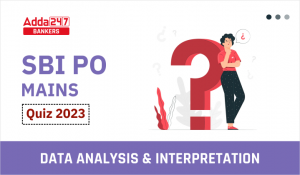Q1. What is an Indian depository receipt?
(a) A deposit account with a public sector bank
(b) A depository account with any of the depositories in India
(c) An instrument in the form of depository receipt created by an Indian depository against underlying equity shares of the issuing company
(d) An instrument in the form of deposit receipt issued by Indian depositories
(e) None of the given options is true
S1. Ans.(c)
Sol. Indian depository receipt is an instrument in the form of depository receipt created by an Indian depository against underlying equity shares of the issuing company.
Q2. Capital market regulator is-
(a) RBI
(b) IRDA
(c) NSE
(d) BSE
(e) SEBI
S2. Ans.(e)
Sol. Capital market regulator is SEBI.
Q3. Many times, we read about future trading in newspapers. What is ‘future trading’?
I. It is nothing but a trade between any two stock exchanges, wherein it is decided to purchase the stocks of each other on a fixed price throughout the year.
II. It is an agreement between two parties to buy or sell an underlying asset in the future at a predetermined price.
III. It is an agreement between stock exchanges that they will not trade the stocks of each other under any circumstances in future or for a given period of time.
Select the correct answer using the codes given below
(a) Only I
(b) Only II
(c) Only III
(d) II and III
(e) None of the given options is true
S2. Ans.(b)
Q4. Which of the following is the regulator of the credit rating agencies in India?
(a) RBI
(b) IRDAI
(c) TRAI
(d) SEBI
(e) NABARD
S4. Ans.(d)
Sol. SEBI is the regulator of the credit rating agencies in India.
Q5. Which of the following cannot be called as a debt instrument as referred in financial transactions?
(a) Certificate of deposits
(b) Bonds
(c) Stocks
(d) Commercial papers
(e) Loans
S5. Ans.(e)
Sol. A debt instrument is a paper or electronic obligation that enables the issuing party to raise funds by promising to repay a lender in accordance with terms of a contract. Types of debt instruments include notes, bonds, debentures, certificates, mortgages, leases or other agreements between a lender and a borrower.
Q6. When an agent asks a customer to invest in a mutual fund product without telling him/her about the risks involved in the investment, the process is termed as-
(a) mis-selling
(b) undertaking
(c) misappropriation of funds
(d) cross-selling
(e) None of the given options is true
S6. Ans.(a)
Sol. Misselling is a significant problem in financial services industry and for financial industry regulators. Brokers, financial advisors, bank representatives or other salespeople of financial products or services who are compensated based on commissions may have significant incentives to sell investments or investment products based on how much they can earn rather than what is suitable or what is needed by a customer. Misselling may occur with insurance products, annuities, investments, mortgages and a variety of other financial products. A financial loss is not necessarily required to meet the definition of misselling; the sale of an unsuitable product is enough.
Q7. The stock market index of London, stock market is referred as-
(a) sensex
(b) footsie
(c) nifty
(d) bullish
(e) None of the given options is true
S7. Ans.(b)
Sol. The Financial Times Stock Exchange 100 Index, also called the FTSE 100 Index, FTSE 100, FTSE, or, informally, the “Footsie”, is a share index of the 100 companies listed on the London Stock Exchange with the highest market capitalisation.
Q8. Which is the first Indian company to be listed on NASDAQ?
(a) Reliance
(b) TCS
(c) HCL
(d) Infosys
(e) None of the given options is true
S8. Ans.(d)
Sol. Infosys Technologies became the first Indian company to be listed on the US NASDAQ in March 1999.
Q9. In the capital market, the term arbitrage is used with reference to-
(a) purchase of securities to cover the sale
(b) sale of securities to reduce the loss on purchase
(c) The simultaneous purchase and sale of an asset to profit from an imbalance in the price
(d) variation in different markets
(e) All of the above
S9. Ans.(c)
Sol. Arbitrage is the simultaneous purchase and sale of an asset to profit from an imbalance in the price. It is a trade that profits by exploiting the price differences of identical or similar financial instruments on different markets or in different forms.
Q10. Which of the following organisations is known as the market regulator in India?
(a) IBA
(b) SEBI
(c) AMFI
(d) NSDL
(e) None of the given options is true
S10. Ans.(b)
Sol. Capital market regulator is SEBI.
Q11. The availability or cash and other cash like marketable instruments that are useful in purchases and investments are commonly known as-?
(a) cash crunch
(b) liquidity
(c) credit
(d) marketability
(e) None of the given options is true
S11. Ans.(b)
Sol. The availability or cash and other cash like marketable instruments that are useful in purchases and investments are commonly known as is liquidity.
Q12. In a company, the use of price-sensitive corporate information by the company people to make gains or cover losses is known as-
(a) insider trading
(b) future trading
(c) foreign trading
(d) stock trading
(e) None of the given options is true
S12. Ans.(a)
Sol. Insider trading is the trading of a public company’s stock or other securities by individuals with access to nonpublic information about the company. In various countries, some kinds of trading based on insider information is illegal.
Q13. Many a times, we read a term ‘SEPA’ in financial newspapers. What is the full form of the SEPA?
(a) Single Exchange Processing Agency
(b) Single Euro Payments Area
(c) Single Electronic Processing Agency
(d) Super Electronic Purchase Agency
(e) None of the given options is true
S13. Ans.(b)
Sol. The Single Euro Payments Area (SEPA) is a payment-integration initiative of the European Union for simplification of bank transfers denominated in euro.
Q14. __________________ is a state-owned investment fund that invests in real and financial assets such as stocks, bonds, real estate, precious metals, or in alternative investments such as private equity fund or hedge funds.
(a) Development bonds
(b) Insurance policies
(c) Mutual funds
(d) Sovereign wealth funds
(e) None of the given options is true
S14. Ans.(d)
Sol. A sovereign wealth fund (SWF) or sovereign investment fund is a state-owned investment fund that invests in real and financial assets such as stocks, bonds, real estate, precious metals, or in alternative investments such as private equity fund or hedge funds. Sovereign wealth funds invest globally.
Q15. The actual return of an investor is reduced sometimes as the prices of the commodities go up all of a sudden. In financial sector, this type of phenomenon is known as-
(a) probability risk
(b) market risk
(c) inflation risk
(d) credit risk
(e) None of the given options is true
S15. Ans.(b)
Sol. Market risk is the possibility of an investor experiencing losses due to factors that affect the overall performance of the financial markets in which he or she is involved. Market risk, also called “systematic risk,” cannot be eliminated through diversification, though it can be hedged against.






 Quantitative Aptitude Quiz For SBI PO Ma...
Quantitative Aptitude Quiz For SBI PO Ma...
 Inequalities Basic Reasoning Quiz for Al...
Inequalities Basic Reasoning Quiz for Al...





